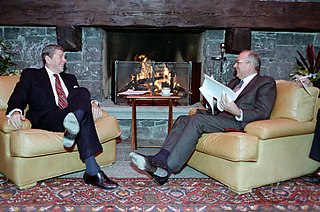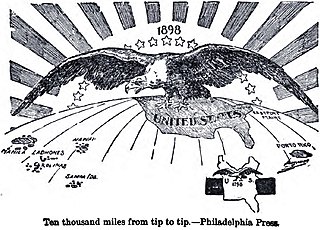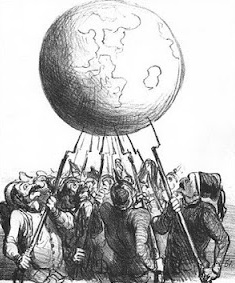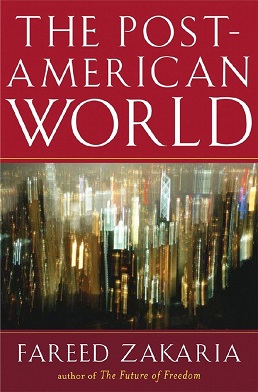Of Paradise and Power: America and Europe in the New World Order is an essay by Robert Kagan which attempts to explicate the differing approaches that the United States and the nations of Europe take towards the conduct of foreign policy. Kagan argues that the two have different philosophical outlooks on the use of power, which are the natural consequence of the United States' possession of power and the Europeans' lack of it.
Initially published in Policy Review magazine, the essay was widely read and the subject of extensive debate and commentary in both America and Europe. In terms of its impact, it was compared by reviewers to Francis Fukuyama's The End of History and the Last Man , Samuel P. Huntington's The Clash of Civilizations , and even George Kennan's X Article. [1]
Of Paradise and Power was a bestseller in multiple countries. It was a New York Times bestseller for ten weeks. It was also a bestseller in the United Kingdom, France, Germany, Spain, Italy, the Netherlands, and Canada. It has been translated into more than 25 languages. [2]
Pax Americana is a term applied to the concept of relative peace in the Western Hemisphere and later the world beginning around the middle of the 20th century, thought to be caused by the preponderance of power enjoyed by the United States. Although the term finds its primary utility in the latter half of the 20th century, it has been used with different meanings and eras, such as the post-Civil War era in North America, and regionally in the Americas at the start of the 20th century. Pax Americana is primarily used in its modern connotations to refer to the peace among great powers established after the end of World War II in 1945, also called the Long Peace. In this modern sense, it has come to indicate the military and economic position of the United States in relation to other nations. For example, the Marshall Plan, which spent $13 billion to rebuild the economy of Western Europe, has been seen as "the launching of the Pax Americana".

A superpower is a state with a dominant position characterized by its extensive ability to exert influence or project power on a global scale. This is done through the combined means of economic, military, technological and cultural strength as well as diplomatic and soft power influence. Traditionally, superpowers are preeminent among the great powers.

The Trilateral Commission is a non-governmental, nonpartisan discussion group founded by David Rockefeller in July 1973 to foster closer cooperation between Japan, Western Europe and North America.

Foreign Affairs is an American magazine of international relations and U.S. foreign policy published by the Council on Foreign Relations, a nonprofit, nonpartisan, membership organization and think tank specializing in U.S. foreign policy and international affairs. Founded in 1922, the print magazine is currently published every two months, while the website publishes articles daily and anthologies every other month.
The Project for the New American Century (PNAC) was a neoconservative think tank based in Washington, D.C. that focused on United States foreign policy. It was established as a non-profit educational organization in 1997, and founded by William Kristol and Robert Kagan. PNAC's stated goal was "to promote American global leadership." The organization stated that "American leadership is good both for America and for the world," and sought to build support for "a Reaganite policy of military strength and moral clarity."

American imperialism consists of policies aimed at extending the political, economic, and cultural influence of the United States over areas beyond its boundaries. Depending on the commentator, it may include military conquest, gunboat diplomacy, unequal treaties, subsidization of preferred factions, economic penetration through private companies followed by intervention when those interests are threatened, or regime change.
Neoconservatism is a political movement born in the United States during the 1960s among liberal hawks who became disenchanted with the increasingly pacifist foreign policy of the Democratic Party and with the growing New Left and counterculture of the 1960s, particularly the Vietnam protests. Some also began to question their liberal beliefs regarding domestic policies such as the Great Society.

Atlanticism, also known as Transatlanticism, is the belief in or support for a close relationship between the United States and Canada, on one hand, and European countries on the other hand, regarding political, economic, and defence issues, in the belief that it would maintain the security and prosperity of the participating countries and protect the perceived values that unite them. The term derives from the Atlantic Ocean that separates North America from Europe.

Robert Kagan is an American neoconservative historian and foreign-policy commentator. Kagan, however, prefers the term "liberal interventionist" to describe himself.

Robert Bruce Zoellick is an American public official and lawyer who was the eleventh president of the World Bank, a position he held from July 1, 2007 to June 30, 2012. He was previously a managing director of Goldman Sachs, United States Deputy Secretary of State and U.S. Trade Representative, from February 7, 2001 until February 22, 2005. Zoellick has been a senior fellow at Harvard's Belfer Center for Science and International Affairs since ending his term with the World Bank. He is currently a Senior Counselor at Brunswick Group.
William Appleman "Bill" Williams was one of the 20th century's most prominent revisionist historians of American diplomacy. He achieved the height of his influence while on the faculty of the department of history at the University of Wisconsin–Madison and is considered to be the foremost member of the "Wisconsin School" of diplomatic history.
Non-interventionism is the diplomatic policy whereby a nation seeks to avoid alliances with other nations in order to avoid being drawn into wars not related to direct territorial self-defense. It has had a long history among elite and popular opinion in the United States. At times, the degree and nature of this policy was better known as isolationism, such as the period between the world wars.

Robert David Kaplan is an American author. His books are on politics, primarily foreign affairs, and travel. His work over three decades has appeared in The Atlantic, The Washington Post, The New York Times, The New Republic, The National Interest, Foreign Affairs and The Wall Street Journal, among other newspapers and publications.
Robert A. Dallek is an American historian specializing in the presidents of the United States, including Franklin D. Roosevelt, John F. Kennedy, Lyndon B. Johnson, and Richard Nixon. He retired as a history professor at Boston University in 2004 and previously taught at Columbia University, the University of California, Los Angeles (UCLA), and Oxford University. He won the Bancroft Prize for his 1979 book Franklin D. Roosevelt and American Foreign Policy, 1932–1945 as well as other awards for scholarship and teaching.

The balance of power theory in international relations suggests that states may secure their survival by preventing any one state from gaining enough military power to dominate all others. If one state becomes much stronger, the theory predicts it will take advantage of its weaker neighbors, thereby driving them to unite in a defensive coalition. Some realists maintain that a balance-of-power system is more stable than one with a dominant state, as aggression is unprofitable when there is equilibrium of power between rival coalitions.

The Post-American World is a non-fiction book by American journalist Fareed Zakaria. It was published in hardcover and audiobook formats in early May 2008 and became available in paperback in early May 2009; the Updated and Expanded Release 2.0 followed in 2011. In the book, Zakaria argues that, thanks to the actions of the United States in spreading liberal democracy across the world, other countries are now competing with the US in terms of economic, industrial, and cultural power. While the US continues to dominate in terms of political-military power, other countries such as China and India are becoming global players in many fields.
The Foreign Policy Initiative (FPI) was an American think tank that operated from 2009 to 2017.

Kimberly Ellen Kagan is an American military historian. She heads the Institute for the Study of War and has taught at West Point, Yale, Georgetown University, and American University. Kagan has published in The Wall Street Journal, The New York Times, The Weekly Standard and elsewhere. She supported the 2007 troop surge in Iraq and has since advocated for an expanded and restructured American military campaign in Afghanistan. In 2009, she served on Afghanistan commander Gen. Stanley McChrystal's strategic assessment team.
The World America Made is a 2012 non-fiction book written by Robert Kagan. In it, Kagan argues against the retreat of the United States as the global superpower and suggests that maintaining the current American-led world order is good for democracy around the world. The book influenced President Barack Obama's 2012 State of the Union Address.
The Jungle Grows Back: America and Our Imperiled World is a 2018 book by American historian and foreign-policy commentator Robert Kagan, published by Alfred A. Knopf. The book's argument is that the world order created by the United States in the wake of World War II is being overrun by jungle-like chaos.











